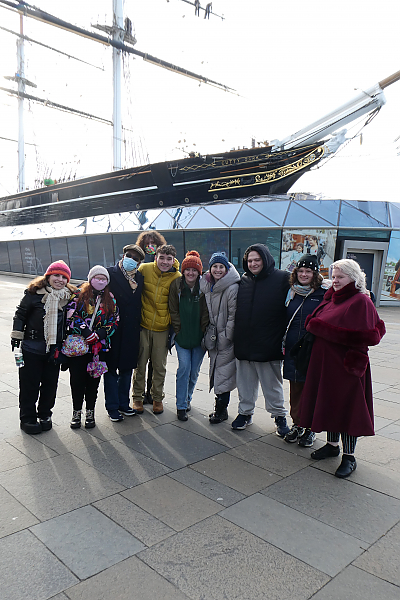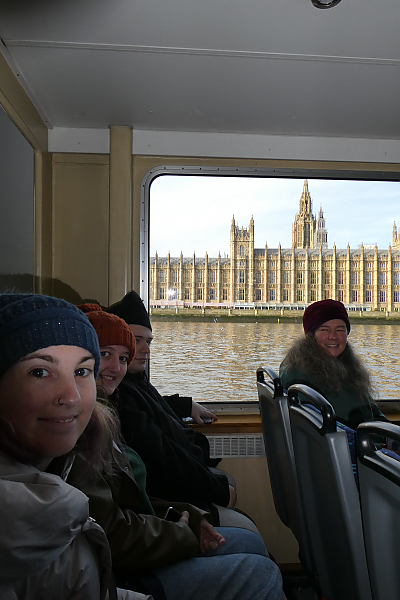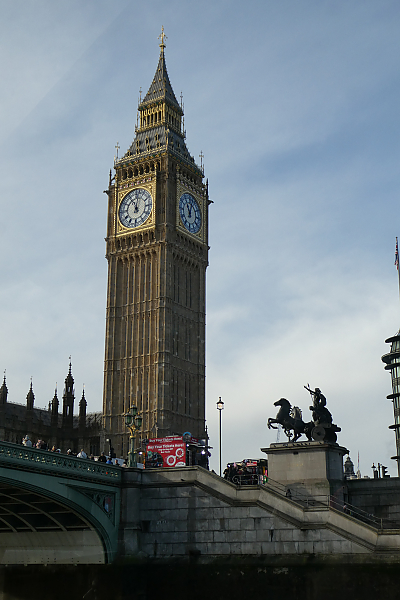Last Day in London & Final Blog Reviews
Today was our last day in London. Although we had considered taking a ride on the London Eye, this was not an option because it was undergoing scheduled maintenance. Instead, we booked a cruise on the River Thames from Westminster Pier to Greenwich where we had a chance to see the Cutty Sark, a British clipper ship built in 1869. A few of us also visited the Royal Observatory where we were able to observe the famous time ball drop at precisely 1 p.m. The time ball was designed to help mariners and others to synchronize their clocks to Greenwich Mean Time (GMT).
The group in front of the Cutty Sark in Greenwich.
Ariana, Marion, Quinn, and Dr. Major on the Thames river cruise between Westminster and Greenwich with the Houses of Parliament in the background.
Big Ben and the Houses of Parliament from the River Thames with a statue on the right of Boadicea, queen of the Celtic Iceni tribe who led an uprising in Roman Britain.
Final Blog Post Reviews from Students:
Paradise Now! By Margaret Perry, Directed by Jaz Woodcock-Stewart at the Bush
Gabe: From the very beginning, it was clear that the play Paradise Now, starring Annabel Baldwin, Michele Moran, Shazia Nicholls, Ayoola Smart, Rakhee Thakrar, and Carmel Winters was going to be a powerful and thought-provoking production. One of the standout elements of Paradise Now was the fantastic performances by the entire cast. Each actor brought their character to life in a way that was both believable and captivating, and it was impossible not to be drawn in by their stories. The set design was also worth mentioning, as it added an extra layer of realism to the production. The use of a practical set that the actors could interact with added a level of immersion that is often lacking in the theatre. But perhaps the most impressive aspect of Paradise Now was its story. A story that follows a group of vulnerable people who get caught up in a pyramid scheme, is all too relevant in today's world. With the proliferation of crypto and NFT scams in recent years, it's easy to see how people can be taken advantage of by unscrupulous individuals. Overall, Paradise Now was a fantastic production that left a lasting impression. The great performances, pragmatic set design, and excellent script all combined to create a truly memorable experience.
Quinn: The two characters that interest me the most are Alex (Shazia Nicholls) and Laurie (Rakhee Thakrar). Alex is interesting written by Margaret Perry—she is a liar and untrustworthy. She tricks Gabriel (Michele Moran) and other people to join the multi-level marketing scheme, particularly knowing it will not magically fix their problems. However, she has human issues and is a mother. I find her panic attacks relatable which I appreciate Perry for adding them in and the director, Jazz Woodcick-Stewart for keeping them in. In a way, Alex is the sympathetic devil. Her deals tend to benefit her, and the person who makes the deal has a high price for little to reward them. The person who is hurt most by this little reward is Laurie. Alex reconnects with her to get her to join the MLM. Laurie thinks she wants to reconnect and become friends. Laurie struggles with socializing and is socially awkward and seems to have a challenging time connecting with others. So, Alex reaching out means a lot to her. Alex talks about how to make money from her MLM selling essential oil. In terms of Laurie’s development as a character, we find out later that although she was making us laugh, her backstory reveals deep hurt in losing her child and her job and who needs to pay off a debt. This makes Alex cry realizing her false promises and realizing her actions have negative consequences and yet still making it about herself by making the person with the dead child comfort her. Which was beautifully done causing a cocktail of emotions.
Best of Enemies, by James Graham, directed by Jeremy Herrin at the Noel Coward theater
Jay Pariser
I would say the overall theme of Best of Enemies is the devastation of American politics and the development of televised broadcasting news. The reason I believe that when I say, during 1968 and to this day, American politics are devastatingly flawed is that F. Buckley Jr. Gore Vidal were not only competing to become the next President and have different methodologies but their deep loathing of each other escalates the strife that America had. William F. Buckley is clearly the conservative of the debate as he feels uncertain about modernism and believes that preserving traditional values is how America should be governed. Gore Vidal is a homosexual liberal who was not only the opposing party in the debate but got under the skin of Buckley as we saw when the cameras were on and off the air. Also, it is important to mention that the Civil Rights Movement was still prevalent during this time and that women and people of color were still facing inequities as those groups of people were actively protesting the government for their rights. These protests were certainly not peaceful as they were gruesome, barbaric, and treacherous as they shook the nation to the core.
Justin Wade
I found this play to be very enjoyable as my favorite part of it was the acting itself. Even though going into the play I didn’t know much about the feud between Buckley and Vidal, I found myself invested in the drama thanks to the portrayals by David Harewood and Zachary Quinto. Both actors portrayed their respective characters which such ferocity and passion whenever they argued against each other. I also found myself being invested from the jump due to the stage design and effects. The stage had this unique look to it that reminded me of a cubicle especially when it came to the upper portion of the stage, as you had actors in rooms designed to look like part of an office. Meanwhile the effects were captivating when it came to scenes with the Vietnam protests as it made them feel believable.
Carolina Mellado
This is one of the best plays I have seen out of all the others we’ve already seen during our adventures here in London. I just loved every single aspect of it from the stage setup to the inserts of humor, like those in The Late Show with Stephen Colbert that I from time-to-time watch with my dad when at home. What I also really appreciated about this play was that it was careful not to overdramatize it too much because in my experience there have been other plays, movies, and tv series that would go overboard with the political drama making it hard to understand how things truly function within our governments. This play does an excellent job in just adding just a little more drama to spice things up but at the same time being respectful of the struggles of that time with the hopes that we can learn that in a new way, we are repeating our mistakes today and that its time to change that.
Wife of Willesden, by Zadie Smith, directed by Indhu Rubasingham at the Kiln Theater
Marion Yager
I feel like the theme of the Wife of Willesden was living life fearlessly. Alvita was a strong independent woman who wasn’t afraid to tell her story full of truth. In this time of Covid and re-adapting to life, I feel like this play is important to remind us to be true to ourselves. Being able to dig deep and share your true story is important.
I thought this play was good. I loved how light-hearted and full of jokes it was. I thought that Clare Perkins, who played Avita, the wife of Willesden, did an outstanding job in her role. I really felt like she embodied the role and fully became her character. Being on stage for the entirety of the show was amazing.
Ben Trachtenberg
January 12th, I had the pleasure of seeing Zadie Smiths, The Wife Of Willesden at the Kiln Theater in London. As an homage to Chaucer’s “The Wife of Bath’s Tale” the story follows in two components. Initially we are treated to a lengthy prologue giving us context for the five marriages Alvita, the titular wife has had and her reasons for having them. Subsequently we are regaled by Alivta about her wise tale. Her story takes place in the 17th century and is an allegory explaining everything he has learned through her various marriages. The whole story is raucously funny and has great tone as it uses a modern style of Chaucer’s language.
The play tackles a variety of themes including sexual liberation, bodily autonomy and love. As one would expect with five marriages, Alvita has experienced many things and loved in many ways. During the prologue we learn how Alvita has navigated being a woman in the modern era and it is hard not to see one’s own pieces of ones own romantic relationships reflected back at us.
Othello, by William Shakespeare, directed by Clint Dyer at the National Theatre
Ariana Ruddy
The part in the play that really got to me was when Othello (Giles Terera) killed his wife Desdemona (Rosy McEwen) because he thought that she was cheating on him with Cassio (Rory Fleck Byrne), but then Iago’s wife Emelia (Tanya Franks) goes to tell Othello that what he was told is all a lie, but before Emelia can tell Othello, Iago kills Emelia so that way Othello never finds out what Iago did. Giles Terera’s Othello did an extraordinary job because he portrayed Othello as being mentally ill, but also being able to marry Desdemona (which didn’t turn out as a happy ending) and also being able to manage Cyprus as its general.
Marion Yager
A headstrong daughter of a senator, elevated by her status but stuck by its expectations. A refugee of slavery, risen to the top of a white world, he finds love across racial lines have costs. Wed in secret, Othello and Desdemona look forward to a new life together. But unseen forces conspire against them, find that their future is not theirs to decide.
The theme of this play was justice, revenge, and hatred. Justice for his wife’s death, revenge for the supposed affair, and hatred for the “betrayal of love”. All these themes lead to the ending with Othello, his wife, and wife’s attendant dead. I thought this play was put on well and had an interesting stage set up. I enjoyed the effects and stage work put into the play.












